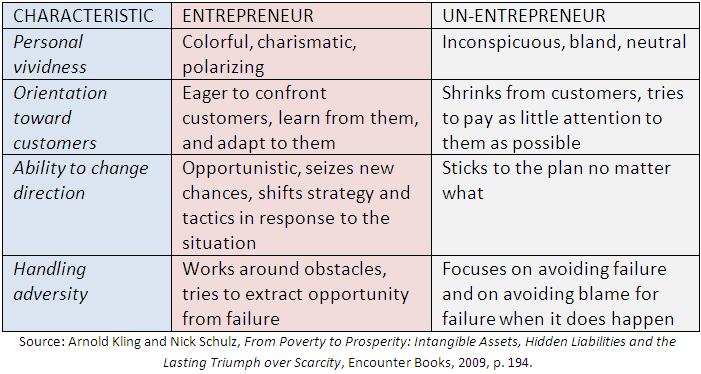I’m a fan of Arnold Kling and Nick Schulz’s From Poverty to Prosperity: Intangible Assets, Hidden Liabilities and the Lasting Triumph over Scarcity. I wrote about it here. It’s about Economics 2.0, as they call it, one key feature of which is putting the entrepreneur front and center — in contrast to much of traditional economics that marginalized or ignored the entrepreneur.
Kling and Schulz offer this table contrasting the characteristics of entrepreneurs and non-entrepreneurs (click to enlarge):
They follow up with a bite:
“If you look carefully at the right-hand column, you will notice something more than just the fact that these characteristics describe someone who is not well suited to being an entrepreneur. Someone who fits the description of an un-entrepreneur would be perfectly suited in another role — as a bureaucrat.”[1]
And more:
“A stereotypical bureaucrat, whether in a government agency or a large corporation, strives to remain inconspicuous and insulated from customers. Bureaucrats seem to prefer planning to action, and they become unhinged by adversity. They examine failure in order to pin blame and warn against recurrence, rather than to look for new opportunities.”[2]
Sounds right to me.
But a question about the traits: When we debate politics and economics, to what extent are we driven by such psychological dispositions, whether inborn or acquired?
That is, setting aside arguments based on economics, politics, and philosophy, how much of this psychology explains the difference between those with an entrepreneurial, free-market orientation — and those who thrive in cronyist corporations, those who advocate for “Third-Way” policies, and even those who desire centrally-planned political-economies?
Sources:
[1] Arnold Kling and Nick Schulz, From Poverty to Prosperity: Intangible Assets, Hidden Liabilities and the Lasting Triumph over Scarcity, Encounter Books, 2009, p. 194.
[2] Ibid., p. 195.
The book has been re-issued as Invisible Wealth: The Hidden Story of How Markets Work (2011).

Fascinating. The left typically paints the entrepreneur as dangerous and politicians and bureaucrats as guardians of standards, safety and oversight.
Remember talking to an intelligent middle-aged woman who had been a lawyer in the former Yugoslavia before it sundered into the horrific ethnic strife of the ’90s. She vividly described the rule of apparatchiks in what could be a line from ‘Atlas Shrugged’, uttering the final clause with inexpressible contempt, “there were less and less people who could make things and do things: there were just people in offices … making rules.”
From my reading of history it is an old pattern of civilizational decline: the state becomes increasingly top heavy, ubiquitous and eventually strangles itself as a parasite does by destroying its host. With the American Federal Register now standing at over 80,000 and counting pages of fine print rules, regulations and notices written and passed by unelected bureaucrats behind closed doors unvetted by the systemic checks and balances of constitutional government America is clearly in this phase. Whether it can be reserved remains to be seen.
I can’t help but think of a pedagogical example to illustrate this state of affairs. It’s like a parent who says, “I just don’t understand: I’m constantly telling my little Billy that he’s bad, I explain to him what not to do, I scold him and punish him daily, I make sure he has no opportunity to practice the wickedness that resides in him and yet he STILL misbehaves.”
“Reversed” – sheesh.
While here … “The whole aim of practical politics,” said H. L. Mencken, “is to keep the populace alarmed (and hence clamorous to be led to safety) by menacing it with an endless series of hobgoblins…” How much regulation is enough? When does it stop? When there are so many rules and penalties in place that we have created a perfect and perfectly safe world? An article in The Economist, February 18, 2012, reports that officials in Bethesda, Maryland shut down children’s lemonade stands because they didn’t have trading licenses. Americans can sleep easier for that.
“As soon as we surrender the principle that the state should not interfere in any questions touching on the individual’s mode of life,” said Ludwig von Mises, “we end by regulating and restricting the latter down to the smallest detail.” Regulation attempts the impossible: to foresee and preempt every conceivable hazard of life – which has been, is, and always will be a risky business – punishing people for harm they might do instead of have done. Its premise accepted there can never be enough of it.
It conjures up an illusory sense of standards and safety. But there’s little downside for a government official who screws up: who was it said that in bureaucracy failure is just an excuse to demand more money and greater power? In contrast an entrepreneur whose product causes injury or death may face huge legal and financial liabilities and even business failure. (Noting the lack of true accountability and fickleness of political will many environmental groups have opted for a market approach by simply buying huge tracts of wilderness for preservation as land trusts).
One of my favorite:
“For every complex problem there is an answer that is clear, simple, and wrong.”
– H. L. Mencken
Right on!
For more on this, I just read this book and highly recommend it, since it brings out the crucial qualities missing from mainstream economics – Entrepreneurship and other Austrian School of Economics insights: https://www.goodreads.com/review/show/6555639138